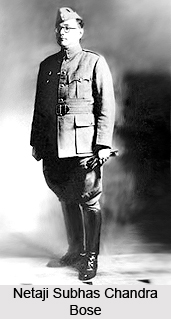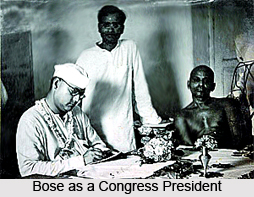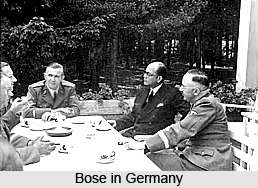 Subhas Chandra Bose was most dynamic leader of India`s struggle for independence. He is more familiar with his name Netaji. His contribution towards India`s Freedom struggle was of a revolutionary.
Subhas Chandra Bose was most dynamic leader of India`s struggle for independence. He is more familiar with his name Netaji. His contribution towards India`s Freedom struggle was of a revolutionary.
Early life of Subhas Chandra Bose
Subhas Chandra Bose was born on 23rd Jan, 1897 in Cuttack, Orissa, India. From his childhood he was a bright student and was a topper in the matriculation examination from the whole of Kolkata province. He graduated from the Scottish Church College in Kolkata with a First Class degree in Philosophy. Influenced by the teachings of Swami Vivekananda, he was known for his patriotic zeal as a student. He went to England to fulfil his parents` desire to appear in the Indian Civil Services.
He stood fourth in order of merit. But he left civil Service`s apprenticeship and joined India`s freedom struggle.
During his service with the Indian National Congress, he was greatly influenced by Bal Gangadhar Tilak and Sri Aurobindo. He did not agree with Gandhiji`s methods of achieving Independence through non-violence. He believed that the only way of achieving Independence was by shedding blood. He therefore returned to Kolkata to work under Chittaranjan Das, the Bengali freedom fighter and co-founder of the Swaraj Party. He was imprisoned for his revolutionary activities on various occasions. In 1921, Bose organized a boycott of the celebrations to mark the visit of the Prince of Wales to India for which he was imprisoned for the first time.
 Bose was elected to the post of Chief Executive Officer of the newly constituted Calcutta Corporation in April 1924. That same year in October, Bose was arrested on suspicion of terrorism. At first, he was kept in Alipur Jail and later he was exiled to Mandalay in Burma. Bose was once again arrested on January, 1930. After his release from jail on September 25, he was elected as the Mayor of the City of Kolkata.
Bose was elected to the post of Chief Executive Officer of the newly constituted Calcutta Corporation in April 1924. That same year in October, Bose was arrested on suspicion of terrorism. At first, he was kept in Alipur Jail and later he was exiled to Mandalay in Burma. Bose was once again arrested on January, 1930. After his release from jail on September 25, he was elected as the Mayor of the City of Kolkata.
Netaji was imprisoned eleven times by the British over a span of 20 years either in India or in Rangoon. During the mid 1930s he was exiled by the British from India to Europe where he championed India`s cause and aspiration for self-rule before gatherings and conferences. Throughout his stay in Europe from 1933 to 1936, he met several European leaders and thinkers.
He travelled extensively in India and in Europe before stating his political opposition to Gandhi. Subhash Chandra Bose married Emilie Schenkl, an Austrian born national, who was his secretary, in 1937 in German. Bose wrote many letters to Schenkl of which many have been published in the book "Letters to Emilie Schenkl", edited by Sisir Kumar Bose and Sugata Bose.
Subhas Chandra Bose became the president of the Haripura Indian National Congress against the wishes of Gandhiji in 1938. He was elected as the president for two consecutive terms. Expressing his disagreement with Bose, Gandhi commented "Subhas` victory is my defeat". Gandhi`s continued opposition led to Netaji`s resignation from the Working Committee. He was left with no alternative but to form an independent party, the "All India Forward Bloc".
 In his call to freedom, Subhas Chandra Bose encouraged full participation of the Indian Masses to strive for independence. Bose initiated the concept of the "National Planning Committee" in 1938. His correspondence reveals that despite his clear dislike for British subjugation, he was deeply impressed by their methodical and systematic approach and their steadfastly disciplinarian outlook towards life.
The contrast between Gandhi and Bose is captured with reasonable measure in a saying attributable to him ""If people slap you once, slap them twice". Having failed to persuade Gandhi for the mass civil disobedience to protest against Viceroy Lord Linlithgow`s decision to declare war on India`s behalf without consulting the Congress leadership, he organised mass protests in Kolkata. The disobedience was calling for the `Holwell Monument` commemorating the Black Hole of Kolkata. He was thrown in Jail and was released only after a seven-day hunger strike.
In his call to freedom, Subhas Chandra Bose encouraged full participation of the Indian Masses to strive for independence. Bose initiated the concept of the "National Planning Committee" in 1938. His correspondence reveals that despite his clear dislike for British subjugation, he was deeply impressed by their methodical and systematic approach and their steadfastly disciplinarian outlook towards life.
The contrast between Gandhi and Bose is captured with reasonable measure in a saying attributable to him ""If people slap you once, slap them twice". Having failed to persuade Gandhi for the mass civil disobedience to protest against Viceroy Lord Linlithgow`s decision to declare war on India`s behalf without consulting the Congress leadership, he organised mass protests in Kolkata. The disobedience was calling for the `Holwell Monument` commemorating the Black Hole of Kolkata. He was thrown in Jail and was released only after a seven-day hunger strike.
Bose`s house in Kolkata was kept under surveillance by the British. With two pending court cases; he felt that the British would not let him leave the country before the end of the war. This set the scene for Bose`s escape to Germany, via Afghanistan and the Soviet Union.
In Germany he instituted the Special Bureau for India under Adam von Trott zu Solz, broadcasting on the German-sponsored Azad Hind Radio. Here he founded the "Free India Centre" in Berlin, and created the Indian Legion consisting of some 4500 soldiers who were the Indian prisoners of war. The soldiers had previously fought for the British in North Africa prior to their capture by Axis forces.






































